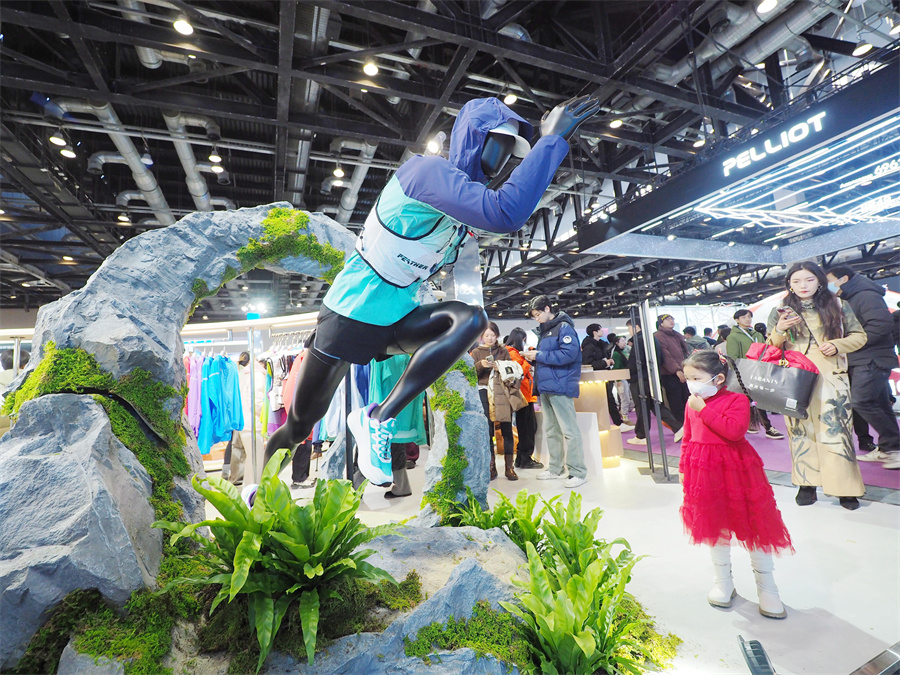
Visitors at the booth of Camel, a professional outdoor brand known for its waterproof jackets, at the ISPO Beijing 2025 exhibition on Friday. [CHINA DAILY]
The outdoor industry in China is undergoing a significant transformation, moving beyond rapid growth driven by camping and general outdoor activities to a more lifestyle-focused market, said industry experts and executives.
This shift was a key theme at ISPO Beijing 2025, a trade fair for sportswear and outdoor goods, which opened in Beijing on Friday and drew nearly 500 exhibitors showcasing innovations across nine categories, including hiking, trail running, winter sports and cycling.
About 10 percent of the exhibitors were new overseas brands, and over 60 percent were first-time participants — showcasing the fast-evolving market landscape, said the show's operators — Messe Munchen and ISPO Group.
The outdoor market in China has been growing steadily. According to ChinaIRN, China's outdoor equipment market grew from 67.5 billion yuan ($9.21 billion) in 2019 to 87.2 billion yuan in 2023, with projections exceeding 90 billion yuan in 2024 and 100 billion yuan by 2028.
Meanwhile, the General Administration of Sport of China reported that annual per capita spending on outdoor products ranges between 2,000 and 5,000 yuan.
"After the surge in outdoor activities since the end of the pandemic, we are seeing a shift," said Tobias Grober, executive director of consumer goods at Messe Munchen and director of ISPO Group.
"The focus is still outdoor-related, but more toward hiking, trail running and camping activities. While consumers are still enthusiastic about outdoor pursuits, they are now increasingly interested in blending fitness with design, music, fashion and personal wellbeing."
Grober said that the rapid rise of camping, once the centerpiece of China's outdoor boom, has begun to normalize.
Today's consumers are exploring new outdoor destinations. This natural evolution in outdoor lifestyles reflects a desire for more tailored and meaningful experiences, he added.
Industry leaders remain optimistic about the potential of China's outdoor market.
Grober said that China's vast geography and diverse consumer base present unique opportunities for growth.
"With mega-cities and a variety of outdoor destinations, from coastal regions to mountainous areas, brands have room to create highly localized strategies," he said.

People look at sporting equipment at the ISPO Beijing 2025 exhibition on Friday. [DU JIANPO/FOR CHINA DAILY]
As the market matures, industry insiders expect to see increased demand for high-quality experiences and personalized products.
Supporting this trend, exhibitors at ISPO Beijing 2025 introduced a wide range of specialized products aimed at experienced outdoor enthusiasts.
Brands like Mobi Garden, known for their outdoor gear, have expanded into high-performance markets with new product lines tailored for challenging environments. Their Cold Mountain series is designed for advanced hikers and mountaineers, covering rugged terrain.
The market for outdoor gear, particularly for essential items like waterproof jackets, has seen significant changes.
Traditional waterproof jackets focused primarily on basic functions such as water and wind resistance. However, today's high-performance jackets have integrated more high-tech elements, showcasing "hardcore "technological advancements in fabrics.
Fashionable and professional jackets for outdoor enthusiasts became the focus of the exhibition.
Camel, a professional outdoor brand known for its waterproof jackets, has its own production and innovation center and has prioritized advanced technology. At the ISPO exhibition, the company launched MICROTOP-TEX fabric jointly developed by Shanghai Jihu and Jiangnan Division of the China Textile Academy.
"This new technology aims to break the dominance of international brands in the fabric sector of waterproof jackets," said Liu Haoyu, product director of Camel.
Meanwhile, interest in winter sports continues to grow.
According to the China Tourism Academy, the scale of China's ice and snow industry reached about 970 billion yuan in 2024.
Japanese goggle brand Swans aims to bank on the snow and ice fever in China. The brand has reported a 30 percent annual sales increase in China since 2022.
"As more people take up skiing and snowboarding, demand for advanced gear with anti-fogging technology has risen sharply," said Wu Dongdong, marketing manager at Tanabe Sports Beijing, which represents Swans in the Chinese market.
Another key trend Grober highlighted is the emergence of high-quality domestic brands with distinctive design identities.
"Twenty years ago, there was little brand awareness in China's outdoor market. Today, not only do consumers value quality, but Chinese brands have also established unique styles and product categories," he said.
Companies like Fire-Maple, a Zhejiang province-based manufacturer specializing in camping stoves, have shifted their focus to lighter, more portable gear to cater to experienced adventurers.
"We're seeing a more mature market where consumers prioritize functionality over flashy branding," said Zhou Qihao, a marketing representative for Fire-Maple.
He said the company tried to extend their products to other camping gear — such as folding tables or chairs — but eventually decided it was best to focus on what they were best at.
Their new stoves are smaller, lighter and easier to pack, reflecting changing consumer needs.
Zhou added that while camping remains popular, buyers are increasingly looking for products that enhance convenience and efficiency.
"When campers arrive at their destination, they want to carry fewer items and enjoy a streamlined experience," he said.
Despite the sector's overall growth, mid-sized and smaller brands are finding it difficult to keep growing sales in a slowdown consumption pattern.
Wonny, a Quanzhou, Fujian province-based manufacturer of gloves for cycling and fitness, has seen steady but modest sales in recent years.
"Our cycling gear now accounts for over 60 percent of our revenue, with the remainder coming from outdoor and fitness products," said Shi Zhongyi, marketing manager at Wonny.
"While partnerships with major sportswear and bike brands have helped us to maintain sales, slower growth is limiting our own branding development."
Grober said that both domestic and foreign brands must differentiate themselves to thrive in China's competitive market.
"Consumers are seeking individuality and fresh designs. A strong unique selling proposition is crucial in standing out," he said.
He also said that while international brands entering China need to adapt to local preferences, Chinese brands aiming for global expansion must refine their strategies, including distribution models and brand positioning.